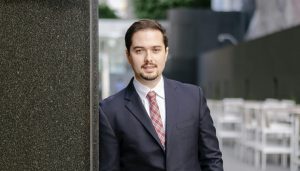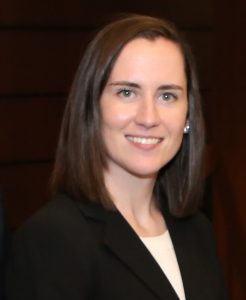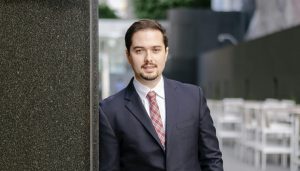Griffen Thorne is an attorney in Harris Bricken’s Los Angeles office. Griffen’s practice includes  intellectual property (IP) as well as transactional, data security, and regulatory matters. As a member of Harris Bricken’s cannabis team, Griffen works with cannabis and hemp clients. Prior to joining Harris Bricken, Griffen was an intellectual property litigator at Lewis Brisbois Bisgaard & Smith LLP in Los Angeles. Griffen graduated from Loyola University of Chicago School of Law in 2015, where he was Editor-in-Chief of the Loyola University Chicago Law Journal and graduated magna cum laude.
intellectual property (IP) as well as transactional, data security, and regulatory matters. As a member of Harris Bricken’s cannabis team, Griffen works with cannabis and hemp clients. Prior to joining Harris Bricken, Griffen was an intellectual property litigator at Lewis Brisbois Bisgaard & Smith LLP in Los Angeles. Griffen graduated from Loyola University of Chicago School of Law in 2015, where he was Editor-in-Chief of the Loyola University Chicago Law Journal and graduated magna cum laude.
Griffen and I sat down to talk about his background, his legal career, and his best pieces of advice for current and prospective law students.
How did you become interested in intellectual property law?
IP is a whole, big universe and that’s why I was first drawn to it. I was a music major in undergrad at the University of California, Berkeley so I was naturally intrigued by how IP protects creative works. I was looking for an intellectually challenging job in the legal field, and of course, IP was my best bet.
How did you end up in your current practice area dealing with cannabis?
I did not expect to work with clients in the cannabis industry or actively seek out that kind of work. But when I joined my current firm, that was a part of the practice so I naturally started doing more and more work for those clients. I was happy to learn right off the bat there are a lot of intersecting and complex issues that come up with cannabis and IP laws.
For example, trademark issues come up with federal and state laws regarding the legality of cannabis. Cannabis is a federally illegal substance and the U.S. Patent and Trademark Office (USPTO) will not issue federal trademarks for marks covering goods or services that violate federal law. So, even though cannabis is legal at the state level in some jurisdictions, the USPTO will not issue a trademark for cannabis goods or services because the mark’s use in commerce is not lawful under federal law. The USPTO might award trademarks to cannabis companies or ancillary service providers for non-cannabis services, such as a clothing item that relates to cannabis but really has little to do with the use of cannabis.
Companies can of course still seek a state trademark (enforceable only within the granting state) for cannabis goods or services with much fewer limitations or qualifications, such as that the trademark be for an ancillary service. For example, it is easier to acquire a California trademark for a cannabis related item than it is to acquire a federal trademark because cannabis is legal under California state law.
But the analysis doesn’t end there. A California cannabis trademark can only be issued to people who lawfully use the underlying goods or services in commerce—i.e., trademark applicants who have all of the required local or state licenses allowing them to conduct cannabis activities in California. State trademarks, however, protect the trademark only within that state and so do not provide the same nationwide level of protection as a federal trademark.
Another issue with state trademarks is what I call “trademark silos” in various states. A company may have a registered trademark in California but not in Nevada. In this case, the mark holder would have rights only in California, not Nevada. They may not ever be able to get rights in Nevada or any other states unless they follow those states’ laws. And as a consequence, other people could register similar or even the same marks in those other states.
Why did you choose Loyola and why would you recommend it to another student?
I chose Loyola in large part because of its excellent Intellectual Property Law program. I love the city of Chicago, and I would recommend Loyola to students because of the first-class professors and the academic experience in an excellent city with a diverse, motivated student body.
What classes or extracurriculars were most valuable, including those outside of IP, and/or do you recommend?
In terms of classes that were most valuable during law school, first and foremost for me was the IP Legal Writing class. It set me up well going into interviews after 1L year because I had some IP-related content and experience to discuss. Next, I would absolutely recommend Professor Cynthia Ho’s general IP class. In Professor Ho’s class, we worked on actual IP-related projects that set me up so well for practice.
In terms of extracurriculars, I absolutely loved being on the Executive Board of the Loyola University Chicago Law Journal as Editor-In-Chief. It was the most rewarding experience of my time in law school. I really enjoyed working with the students and professors involved with the Journal, and I especially developed some great relationships with certain professors. I was in contact and working with many important people as Editor-In-Chief, and I enjoyed having the discretion and influence to select changes for the Journal.
What advice do you have for aspiring IP lawyers?
My first piece of advice is to gain some IP experience as a first-year law student. Throughout law school, take IP classes and most importantly, network with IP practitioners. If your law school has a Moot Court Team—such as Loyola’s Trademark Moot Court Team—joining it would be excellent experience. Data security is an exploding field, so any classes you can take regarding data security would prepare you well. Work in the data security field is sophisticated and even more cutting edge than some other types of IP work. So, my advice for aspiring IP lawyers is to consider data security law as well.

Jackie McDonnell
Assistant Blogger
Loyola University Chicago School of Law, J.D. 2021
